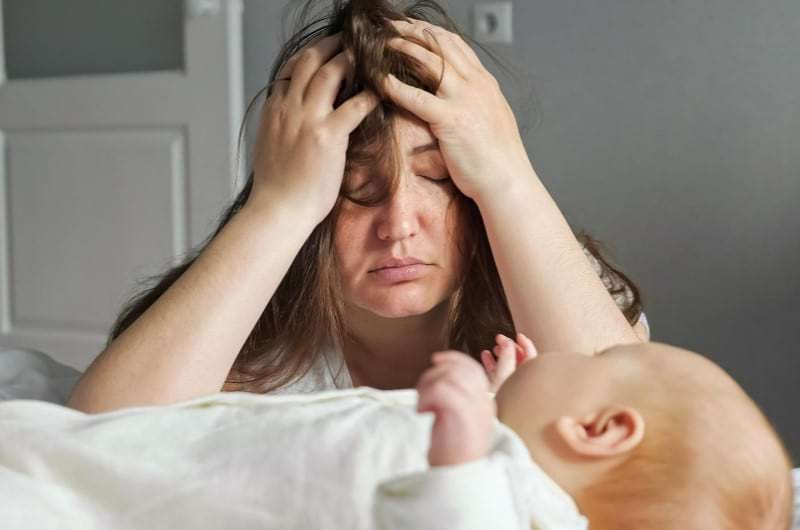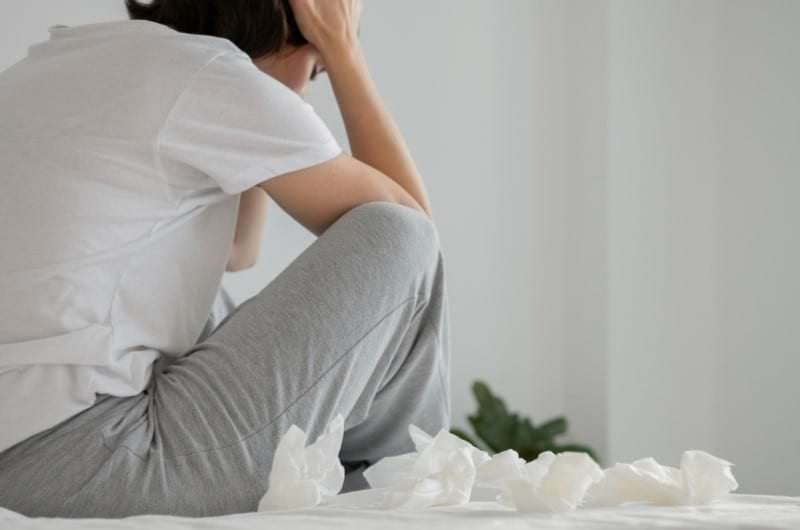Prenatal and postpartum anxiety pose a great challenge to the baby and mother’s health. It revolves around fear and stress, which converts into anxiety. Tensed muscles, hormonal changes, panic attacks, past experiences, mental and physical pressure of nursing, and many other factors could be the reason behind it. Medical or non-medical treatment options can help you cope with this situation. Also, cognitive behavioral treatment, medication, and changes in lifestyle can help new mothers to make their lives easier. If some negative thoughts persist or nothing works, get professional help without wasting time.
Pregnancy marks a turning point in a woman’s life. For first-time mothers, it is the beginning of a journey they have been nervously waiting for.
In many cases, the big question is similar: How prepared are they for pregnancy?
Pregnancy comes with its own baggage. Biologically, it changes a lot of things in a woman’s body.
Hormonal changes and fluctuations during or after pregnancy can lead to either weight gain or weight loss, high libido, hair loss, morning sickness, and many more.
These changes could lead to a high level of discomfort and fear.
Getting anxious during or after pregnancy is quite normal. However, something has to be done if the anxiety becomes a regular feeling that eventually brings about extreme discomfort.
Taking a step is mandatory if it gets worse and interferes with the everyday life of the woman.
If this fear and nervousness happens during pregnancy, it is called prenatal or antenatal anxiety.
If it is after giving birth, it is called postpartum or postnatal anxiety.
What is prenatal anxiety?
Prenatal anxiety is when a woman experiences extreme anxiety during pregnancy.
In most cases, especially in the United States and the UK, prenatal anxiety is so serious that it interferes with the well-being of the woman and puts both her health and that of the baby at risk.
The feeling keeps coming, most times without any reason.
Especially when done without medical aid of any kind, controlling prenatal anxiety can be tough.
This is why it is advisable to complement personal control measures with professional medical support.
What is postpartum anxiety?
While prenatal anxiety happens during pregnancy, postpartum anxiety happens after the birth of the baby.
It is that deep and persistent fear and anxiety that comes after giving birth or becoming a parent.

In most cases, the anxiety gets so extreme that it becomes uncontrollable and eventually takes over the woman’s thoughts.
It is a common anxiety disorder that is usually mistaken for postpartum depression, but the two are not the same thing.
While postpartum depression comes with constant worry and fear accompanied by intense sadness, postpartum anxiety is only restricted to fear and worry without sadness.
How do I know that I have prenatal or postpartum anxiety?
It is possible to confuse normal worry for anxiety, but when the symptoms become glaring, they are easy to recognize.
To be sure of your feelings, see a professional for a proper diagnosis while it is still early.
Below are the most common symptoms of both prenatal and postpartum anxiety:
Prenatal anxiety
- Having constant panic attacks
- Having an uncontrollable and overwhelming fear of nursing
- Having tensed muscles during your day-to-day activities
- Having sleeping difficulty
- Experiencing constant mood swings and high irritability to common things like the smell of toothpaste, milkshake, or even your favorite sandwich
- Finding it hard to concentrate on things
- Intentionally avoiding antenatal activities like doctor’s appointments and baby discussions
Postpartum anxiety
- Having a high breathing rate and sweating constantly
- Constant checking of the baby to be sure he or she is breathing
- Always having bad thoughts about the baby and her safety
- Being too scared to go far away from the baby
- Having difficulty sleeping since more time is spent watching over the baby sleep at night
What causes prenatal and postpartum anxiety?
Since prenatal and postpartum anxiety are common conditions that affect many expectant and new mothers, it is important to know their causes.
This is a necessary step for providing essential support and care.

While the exact triggers of these anxiety disorders can vary from person to person, there are common factors that generally contribute to these conditions.
Causes for prenatal anxiety
According to recent studies, prenatal anxiety often originates from a combination of hormonal changes, physical discomfort, and the anticipation of motherhood.
It is mainly caused by that feeling of unpreparedness and uncertainty about pregnancy and all there is to it.
- Changes in hormones
- Intense discomfort
- Preparation for motherhood
- Exposure to negative prenatal information
- Past Experiences
Causes for postpartum anxiety
In contrast, postpartum anxiety can be linked to hormonal fluctuations after childbirth, sleep deprivation, and the pressures of caring for a newborn.
This is more like a reaction to the realities of being a mother and the weighty responsibilities that come with it.
- Change and fluctuations in hormones
- Feeling of responsibility
- Sleeplessness
- Draining babysitting activities like diaper changing and breastfeeding
Lastly, prenatal and postpartum anxiety can be caused by past experiences.
A first-time mother might develop both prenatal and postpartum if she once witnessed the stress that comes with motherhood from a relative, friend, or neighbor.
Meanwhile, a woman with her second pregnancy can develop prenatal and postpartum anxiety due to her first pregnancy experience.
These factors, among others, play a pivotal role in the development of prenatal and postpartum anxiety.
What are the symptoms and best diagnosis?
The symptoms of both prenatal and postpartum anxiety are similar. It is easy to identify which one you are currently suffering from based on the stage of the situation or the stage of your pregnancy.
Common symptoms of prenatal and postpartum

The common symptoms of both prenatal and postpartum anxiety include:
- Excessive worry
- Mood swings
- Physical symptoms like restlessness, muscle tension, insomnia
- Difficulty in concentration
- Negative thoughts
- Constant checking of the baby
- Avoiding antenatal and postnatal activities
Is it possible to have all these symptoms and still not have prenatal or postpartum anxiety?
As long as it is common for people to mistake mere worries for other anxiety disorders, it is possible to have these symptoms but still not have prenatal and postpartum anxiety.
However, the only way to find out if you are facing prenatal or postpartum anxiety as an expectant or lactating mother is to go for a diagnosis.
How do you deal with these anxiety signs?
A proper diagnosis is necessary for the timely and effective management of prenatal and postpartum anxiety.
Since it is handled by experienced medical professionals, it ensures that mothers receive the support they need during this transformative period.
The most common diagnosis is a clinical assessment.
Clinical assessment
In a clinical assessment, an expectant or lactating mother who suspects that she is suffering from either prenatal or postpartum anxiety books an appointment with a specialist.
It could be a psychologist, gynecologist, obstetrician, or even a midwife.
In a clinical assessment, the mother is exposed to the right questions and activities that can determine whether she has any of these anxieties or not.
For instance, the Edinburgh Postnatal Depression Scale (EPDS) is one of the many tools these specialists use in diagnosing and measuring the anxiety levels of certain anxiety disorders, like prenatal and postpartum anxiety.
It is the result of the assessment that will determine if there will be a need for treatment options, collaborative care, and any other means to help the mother regain stability and feel comfortable again.
Risks involved for the mother and baby
Medically, prenatal and postpartum anxieties are both classified as anxiety disorders.
Just like every other anxiety disorder, they come with risks. Risks that can affect both the mother and the baby.
Risk for the mother
Both prenatal and postpartum anxiety can lead to:
- Compromised mental health can result in depression and other anxiety disorders
- Physical health consequences like high blood pressure, chronic insomnia, fatigue, etc
- Miscarriage
Risk for the baby
- Premature birth and low birth weight
- Negative influence on developmental milestones and cognitive development
- Behavioral changes like distress and loose bond with the mother
Treatments for prenatal and postpartum anxiety
Prenatal and postpartum anxiety are not irrevocable conditions. They can be treated by experienced professionals just like other anxiety disorders.
The most important thing is to identify the mother’s prevailing symptoms and health history. This will help the specialist choose a beneficial treatment and management method.
The most common ones are:
Cognitive-behavioral treatment
This can be shortened to CBT. It is one of the most common ways professionals handle anxiety disorders.
It is a technique therapists or psychologists use to help patients identify their emotions and change their thought patterns.
Using a question-and-answer format, these professionals help mothers learn how to identify their stressors and anxiety triggers.
The method also includes showing them better ways to respond to stress and anxiety.
Medication
In severe cases where CBT proves ineffective or does half of the treatment, medications become the last resort.
Apart from continuous patient education, breastfeeding considerations, and monitoring of side effects, the most common medication is the use of Selective Serotonin Reuptake Inhibitors, known for short as SRRIs.
It is a common medication for stress and anxiety.
Non-medicinal ways to reduce prenatal and postpartum anxiety
The severity of prenatal and postpartum anxiety depends on individual symptoms and the health history of the concerned mother.
In cases where the impact is low and does not require medical support, other things can be done.
Change of lifestyle
A change in lifestyle can go a long way in helping a woman fight prenatal and postpartum anxiety.
Below are some change of lifestyle tips:
- Take care of yourself by eating healthy and resting more often
- Exercise regularly and drink more water to stay hydrated
- Obey your antenatal and postnatal routines at the hospital
- Join support groups for new mothers. You can find dozens of them online
- Get childcare support if you can
Ultimately, monitor your anxiety level by sticking to a check-up routine and ensure to seek medical support if things get out of hand.
FAQs
How can I differentiate between normal pregnancy worries and prenatal anxiety?
Normal pregnancy worries usually revolve around typical concerns related to childbirth and parenting, while prenatal anxiety involves intense, persistent, and distressing fears that can interfere with daily life.
Can postpartum anxiety affect a mother’s ability to bond with her baby?
The constant fear, stress, and intrusive thoughts torturing the mother can create a pause in the affiliation process. Therefore, her bonding process gets hard or delayed.
How friends and family can help in coping with prenatal and postpartum anxiety?
Friends, family, and support groups are necessary at this crucial time. The emotional reassurance, practical help, care, and kindness they offer reduce isolation and help mothers manage anxiety.
Do fathers experience prenatal and postpartum anxiety, and how can they cope?
Fathers can experience prenatal and postpartum anxiety as well, though it’s more common with mothers.
However, open communication with the partner, seeking support from family and friends, therapy, or counseling can help the father to come out of this traumatic phase as well.
Can prenatal and postpartum anxiety be treated permanently?
These anxieties can not be treated permanently. Because it’s natural, and in every pregnancy, there is a high chance of developing it.
So, there is a need for continuous self-care and anti-anxiety therapies.
References
- https://bmcpregnancychildbirth.biomedcentral.com/articles/10.1186/1471-2393-12-55
- https://www.who.int/news-room/fact-sheets/detail/maternal-mortality
- https://www.statista.com/topics/1850/pregnancy/#topicOverview
- https://my.clevelandclinic.org/health/diseases/22693-postpartum-anxiety
- https://www.pregnancybirthbaby.org.au/anxiety-and-pregnancy
- https://www.tommys.org/pregnancy-information/after-birth/postnatal-anxiety#:~:text=The%20main%20treatments%20for%20mental,or%20a%20combination%20of%20these.
- https://www.health.harvard.edu/blog/postpartum-anxiety-an-invisible-disorder-that-can-affect-new-mothers-202107302558
- https://www.nytimes.com/2020/04/15/parenting/postpartum-anxiety.html
- https://www.acog.org/womens-health/experts-and-stories/the-latest/what-i-tell-my-pregnant-and-postpartum-patients-about-depression-and-anxiety
- https://www.health.ny.gov/community/pregnancy/health_care/perinatal/perinatal_depression.htm


